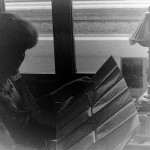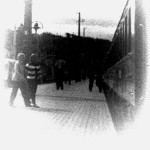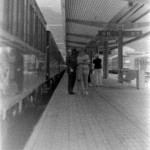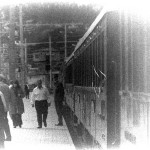Here are a few more images that accidently got solorised in the darkroom.
Some of those above look like they have been created by a pinhole camera. The one below was…
 The pinhole camera used to take this photograph in Havanna in 1999 was handmade by the photographer(?) for the purpose of taking photos of tourists. In its simplest form, the photographic pinhole camera consists of a light-tight box with a pinhole in one end, and a piece of film or photographic paper wedged or taped into the other end. A flap of cardboard with a tape hinge can be used as a shutter. The pinhole is usually punched or drilled using a sewing needle or small diameter bit through a piece of tinfoil or thin aluminum or brass sheet. This piece is then taped to the inside of the light tight box behind a hole cut through the box. A cardboard box can be made into an excellent pinhole camera.
The pinhole camera used to take this photograph in Havanna in 1999 was handmade by the photographer(?) for the purpose of taking photos of tourists. In its simplest form, the photographic pinhole camera consists of a light-tight box with a pinhole in one end, and a piece of film or photographic paper wedged or taped into the other end. A flap of cardboard with a tape hinge can be used as a shutter. The pinhole is usually punched or drilled using a sewing needle or small diameter bit through a piece of tinfoil or thin aluminum or brass sheet. This piece is then taped to the inside of the light tight box behind a hole cut through the box. A cardboard box can be made into an excellent pinhole camera.




